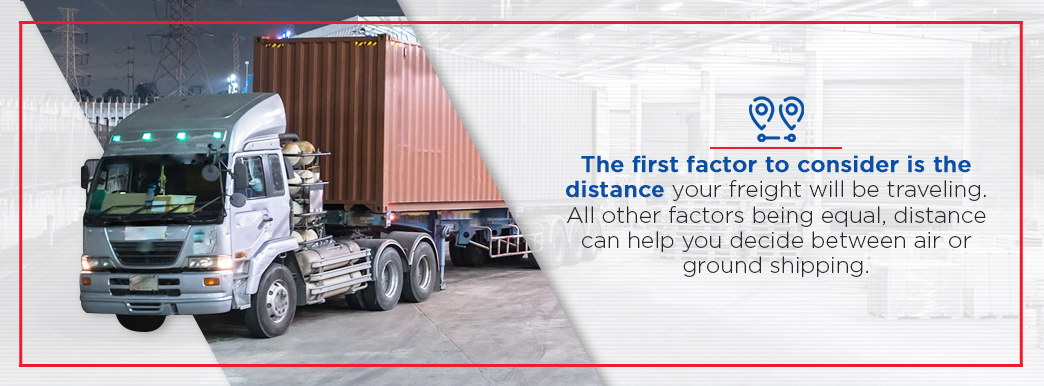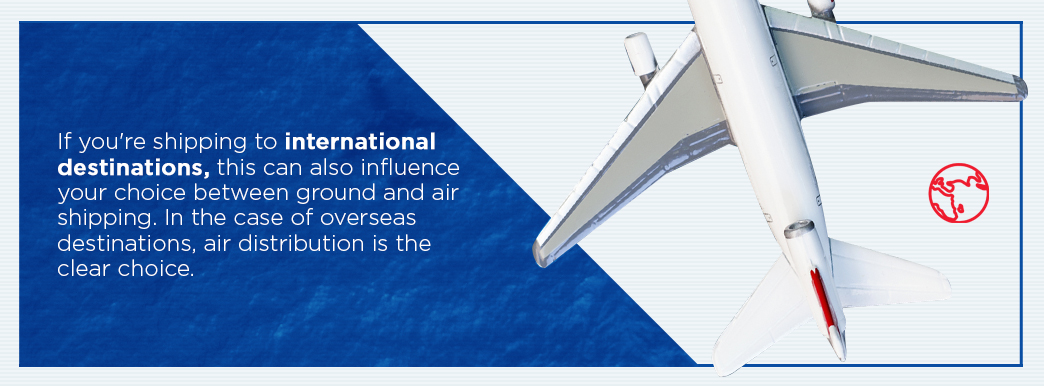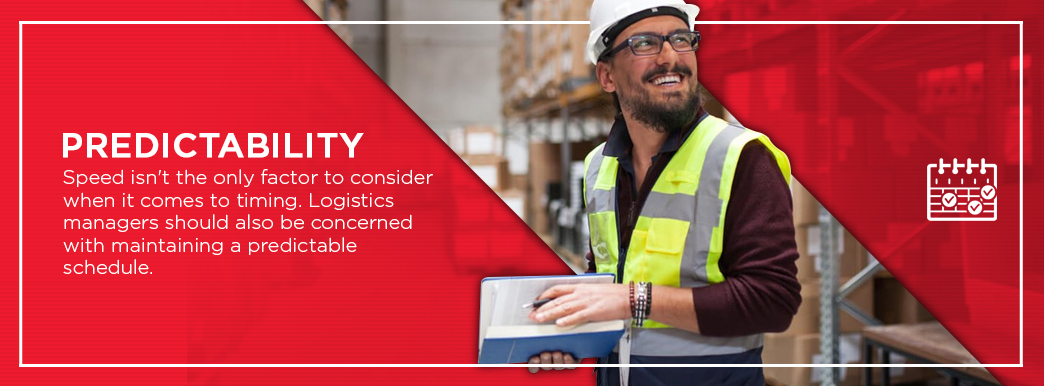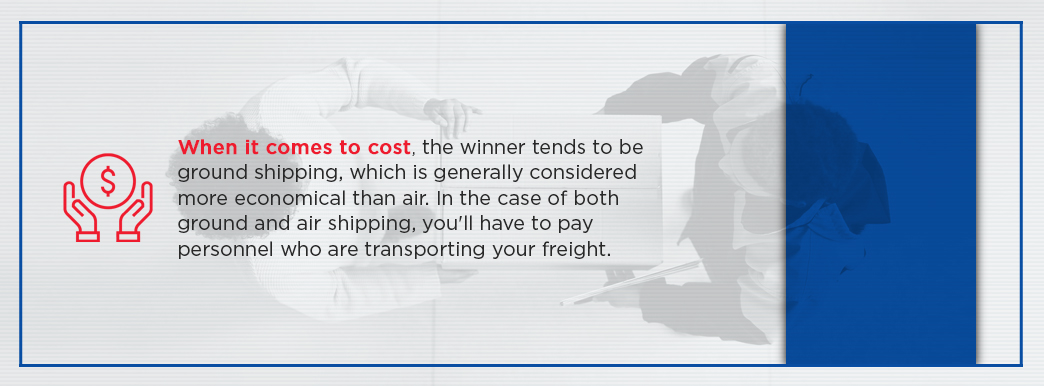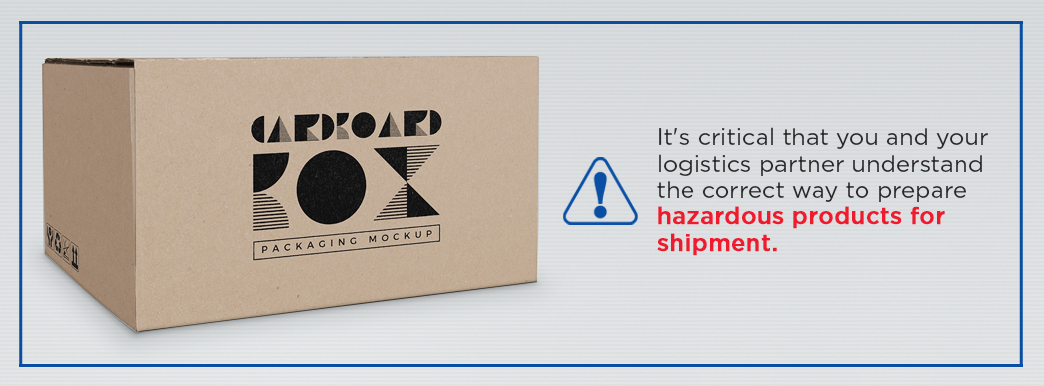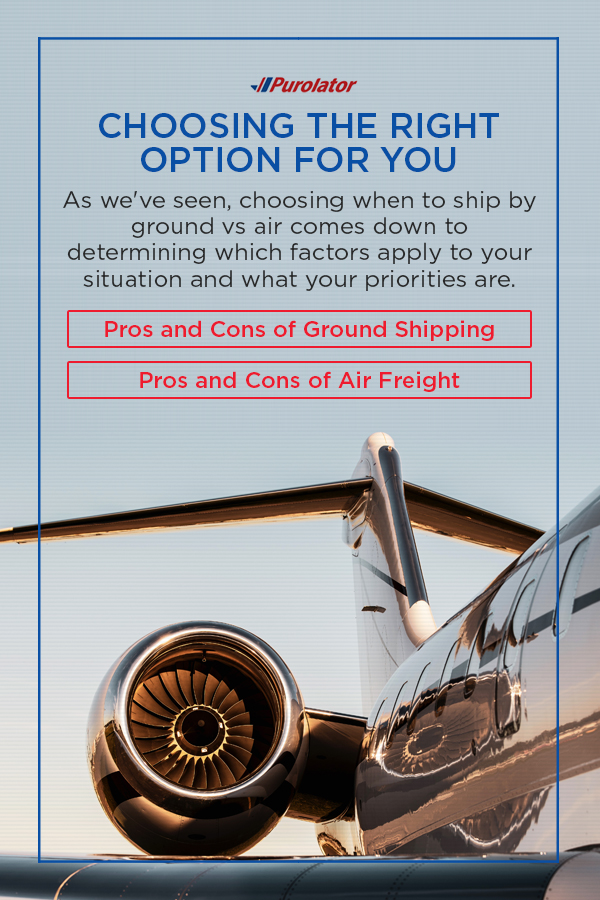Blog
When to Ship Via Ground vs. Air
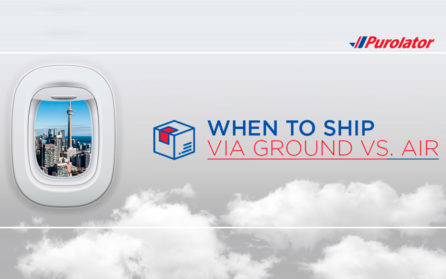
One weak link in the supply chain can cause a major disruption to a business. Every aspect of your supply chain is important, but you cannot overestimate the significance of logistics. No matter how much precise planning, hard work and financial resources go into a product, if it is lost or damaged during shipping or arrives at its destination late, you could leave customers dissatisfied with their experience or damage your relationships with wholesalers, distributors or whoever is expecting your shipment.
To avoid this scenario, you need shipping you can count on to carefully transport your goods to their destination. Of course, you also have to consider the cost. The right shipping solution is one that is both reliable and cost-effective. The solution may differ from one shipping scenario to another.
While ground and air are not the only two shipping methods available, they tend to be the two most popular options. Take a close look at ground vs. air shipping logistics to see when it makes sense to use one option instead of the other.
The Factors to Consider When Choosing Between Ground Shipping and Air Freight
To understand the differences between ground shipping and air shipping and when it makes sense to use one method over the other, it’s helpful to understand the various factors that influence your decision.
1. Distance
The first factor to consider is the distance your freight will be traveling. All other factors being equal, distance can help you decide between air or ground shipping. If your shipping destination is local or just a zone or two away, it typically makes more sense to choose ground shipping. Because ground shipping is a more economical option, you’ll want to go this route in most cases when a truck could get your freight delivered on time.
If you’re shipping to a location that’s thousands of miles away, however, you would need to ship by air to get your freight to its destination in a timely manner. If time isn’t a factor, then you may still want to use ground shipping, even for long-distance destinations. An example of this scenario would be if you were delivering low value replacement stock to a company’s store or warehouse, and they don’t expect to go through their existing inventory for a week or more. Note, however, that at a point, you could end up spending more on ground shipping than air freight for very long distances. When the shipments contain high value shipments, it is often important to get the good delivered as quickly as possible and avoid having inventory in transit.
2. International Destinations
If you’re shipping to international destinations, this can also influence your choice between ground and air shipping. In the case of overseas destinations, air distribution is the clear choice. This not only includes international destinations but also Hawaii.
In addition to air shipping, another option for overseas shipping is ocean freight. Ocean freight is commonly used for shipping commodities like grain, coal, iron ore or crude oil in bulk. The downside of transporting by sea is that it takes significantly longer than shipping by air. Shipping by air will typically only take a day or two while an ocean carrier will take around a month to arrive at its destination.
When shipping from the U.S. to other countries in North and South America, your options open up to include both ground and air shipping. Distance will be a key factor here.
In many cases, a U.S. company might need to ship to Canada. Consider the difference in shipping from Buffalo, New York to Toronto, Ontario — just under 100 miles apart — and shipping from Buffalo to Edmonton, Alberta — a distance well over 2,000 miles. In the case of the Toronto destination, ground shipping is a perfectly valid choice and can still allow you to deliver your freight in a timely manner. You would even get faster delivery on the ground than in the air in many short distance deliveries. In the case of the Edmonton destination, air freight would likely be the best choice.
International shipping also involves added logistics you don’t deal with in the case of domestic shipping, such as going through customs and paying duty taxes and tariffs. The added steps and fees are consistent whether you choose air or ground shipping. In either case, the key is to a smooth border clearance process is careful preparation.
3. Speed
Speed is often a top concern for logistics managers because it is a top concern for their customers. Speed has become a major priority and expectation for customers of e-commerce companies. In addition to online retailers, businesses that can benefit from expedited shipping include those in the automotive, aerospace, pharmaceutical and retail industries. Even if you are a B2B business, the companies you’re shipping to will likely want to receive deliveries in a timely manner so their entire supply chain moves fast enough to keep up with customers’ expectations.
When asked what made for a positive experience shopping online, U.S. shoppers prioritize fast shipping over anything else, such as an easy return policy or friendly customer service. “Fast” may be a relative term, but many shoppers think “fast” means same-day delivery.
When it comes to the speed of ground shipping vs air freight, air is generally much faster. Unless your destination is a short distance away, you’ll be able to ship your package by air in a fraction of the time it would take to ship it by truck. That said, ground shipping services can be just as fast in some cases. Expedited ground service, sometimes called “flying trucks,” can surpass the speed of air freight. However, this service tends to come with a premium cost.
In most cases, if you’re willing to pay more to deliver your shipments as quickly as possible, air freight is the way to go. Whereas it would take a freight truck a matter of days or even a week to travel across the country, an airplane can make it from coast to coast in a matter of hours.
4. Predictability
Speed isn’t the only factor to consider when it comes to timing. Logistics managers should also be concerned with maintaining a predictable schedule. A variety of factors can influence the time it takes your shipment to arrive at its destination, but it’s always better when you can accurately predict your delivery schedule. This way, you can faithfully meet deadlines without having to give your customers a wide window for estimated delivery date and time.
So, which shipping method helps you adhere to a more predictable schedule? The answer is typically air freight, as there are fewer variables that can affect a flight schedule compared to a road trip. Consider the many complications that can cause delays on the road, including road closures, accidents, heavy traffic and hazardous weather. If you choose to ship by less-than-truckload (LTL) ground shipping, then the truck will have to make stops for other deliveries, as well.
Of course, flight delays can also occur for a number of reasons such as changes in air traffic, maintenance issues with the aircraft and weather conditions. The difference is that most flight delays will only last a few hours, so they will have a minor effect on the delivery schedule.
5. Cost
Cost is a concern for any logistics manager making decisions about the best way to ship their products. Especially as customers are becoming more and more accustomed to not paying for shipping, companies are shouldering the cost and need to be as economical as possible to maintain profit margins.
When it comes to cost, the winner tends to be ground shipping, which is generally considered more economical than air. In the case of both ground and air shipping, you’ll have to pay personnel who are transporting your freight. The time it takes them to make a delivery is typically much longer with ground shipping, so why is ground shipping more affordable? For one, a delivery truck only needs one driver while an airplane requires potentially dozens of employees.
Other factors that making shipping by air more expensive are the cost of airline fuel, which far exceeds the cost of gasoline and the increased security measures that come with flying. As a higher demand is being placed on fast shipping, air freight has become more popular, which also contributes to the higher cost.
One of the only situations in which ground shipping may become more expensive than air freight is if the freight vehicle has to travel an exceptionally long distance. The cost of fuel and the driver’s time may begin to add up to cost more than putting your shipment on a cargo plane. Other factors like size and weight can influence the cost to ship by air or on the ground.
On the face of it, in most instances, ground shipping is more cost-effective, but determining the most profitable option often comes down to more than just the straight cost. In this case, paying extra to ship by air may help you meet and exceed customers’ expectations for speed, leading to increased profits. So, you may find shipping by air is ultimately more profitable for your business.
6. Security
The more comprehensive security measures can be one of the reasons to choose air freight instead of ground shipping. Generally, ground shipping involves some risk. A shipment could be stolen, lost or tampered with.
This is especially the case when a delivery truck is stopping at multiple locations and the cargo is left vulnerable while a driver makes a delivery. According to the FBI, cargo theft alone accounts for around $30 billion in losses every year. Some logistics partners that offer ground shipping will be more conscientious about protecting your freight along its journey than others. There are many ways these logistics partners can help you reduce the risk of damage, losses or theft to your cargo.
With air freight shipping, there tends to be a higher level of surveillance and many security checkpoints already in place that can help ensure your shipment arrives at its destination. You won’t have to worry about your freight being vulnerable to theft or other risks that can be present with ground shipping.
7. Size and Weight
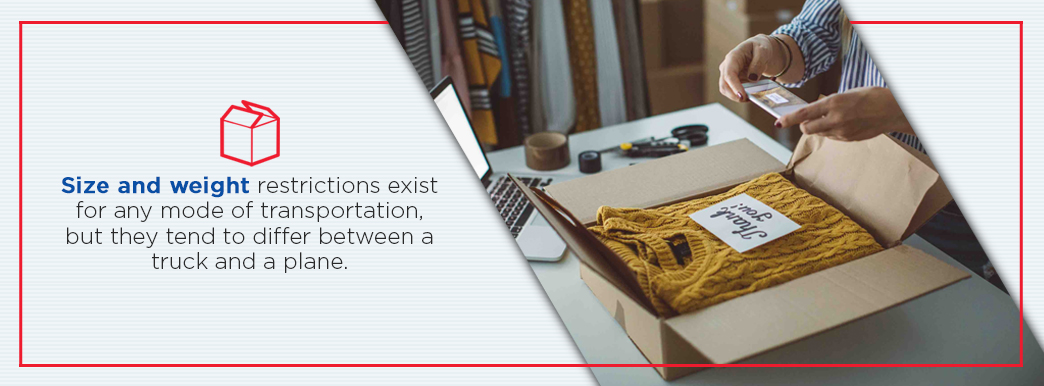
There also tends to be more flexibility with ground shipping when it comes to the volume of your shipment. Airlines typically have a dimensional weight (DIM) pricing policy in place where you can expect a substantial oversize charge if your shipment exceeds 194 cubic inches in the case of domestic shipments and 166 cubic inches in the case of international shipments. Even if your individual products are not large, if you plan to ship them in large volumes, you’re likely better off to use ground shipping.
For freight that is relatively light and compact, air shipping may prove to be a better choice, especially if you’re working with tight deadlines. But in the case of large or heavy freight, ground shipping is usually a better choice to remain cost-effective.
8. Hazardous Materials
We’ve talked about the size and weight of your freight, but another factor to consider is whether the freight presents any potential dangers. In other words, are you shipping something that is considered to be a hazardous substance? Greater attention has been given in recent years to the need for companies to comply with all regulations concerning the shipping of hazardous materials.
In the U.S., the transportation of hazardous materials (hazmat) is regulated by the U.S. Department of Transportation. In Canada, The Transportation of Dangerous Goods Program is responsible for developing safety regulations concerning hazmat shipping. Another Canada-based body to be aware of is the International Air Transport Association (IATA). The IATA is a trade organization that sets the global standard for shipping dangerous goods by air.
It’s critical that you and your logistics partner understand the correct way to prepare hazardous products for shipment. This typically involves labeling packages with the class of hazardous substances they belong to and preparing a shipping paper.
You may be surprised by how many products are considered hazardous materials. Anything from household cleaning sprays to essential oils to nail polish is classified as hazmat. While you’ll have to abide by the relevant hazmat regulations whether you ship via ground or air, depending on what type of hazardous material you are shipping, you may have to ship by ground. Check the Dangerous Good Regulations guide from IATA to see whether air freight is an option for your shipment.
Choosing the Right Option for You
As we’ve seen, choosing when to ship by ground vs air comes down to determining which factors apply to your situation and what your priorities are. Both methods offer their own advantages, so the question is, which advantages matter most to you? Is it security? Speed? Cost? Or something else?
Pros and Cons of Ground Shipping
Some of the advantages of ground shipping are:
- It allows for heavy and oversized freight
- It works for hazardous materials that may not be allowed on a plane
- It costs far less than air freight
The disadvantages of ground shipping are:
- It’s typically much slower than air shipping
- It can be less predictable
- It’s more vulnerable to security problems
Pros and Cons of Air Freight
Air freight offers its own advantages, including:
- It’s the fastest shipping method
- It follows a more reliable schedule
- It includes more security measures
The disadvantages of air shipping are:
- It’s more expensive than ground shipping
- It’s not designed for heavy or oversized freight
- It does not allow all hazmat on board
There are some exceptions. For example, some expedited ground shipping services can rival the speed of air shipping but will also come with a much higher cost than typical ground shipping. Though air shipping tends to be more reliable, delays are possible. Still, these pros and cons speak to what you can typically expect with both ground and air shipping so you can make an informed decision.
Purolator International Is Your Solution for Fast, Reliable Shipping
Whether you’re shipping by ground or air, you need a logistics partner you can trust to strengthen your supply chain and help you get your freight to its destination efficiently and securely. Purolator International is a supply chain logistics solutions provider you can trust. We are based in the U.S. and specialize in shipping express, freight and parcel shipments within, to and from North America. We are especially known for our expertise in shipping from the US. to Canada.
Our vast network of best-in-class transportation providers includes the largest ground network and dedicated air fleet in Canada and extends throughout the U.S., as well. When you partner with Purolator International, you can expect exceptionally efficient and dependable services that are customized to fit your business. We can work with you to determine the best shipping methods to help you meet your business goals and leave your customers satisfied.
Purolator International has developed a reputation for excellence that has earned us several industry awards. We’ve been recognized for our ongoing dependability and innovation in the field. Especially if your company sends express, freight or parcel shipments to Canada, Purolator International is a logistics partner you can trust to add a strong link in your supply chain. Contact us today to learn more.
